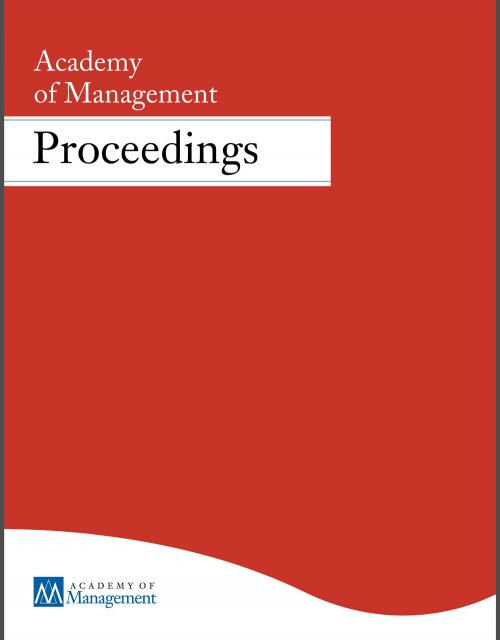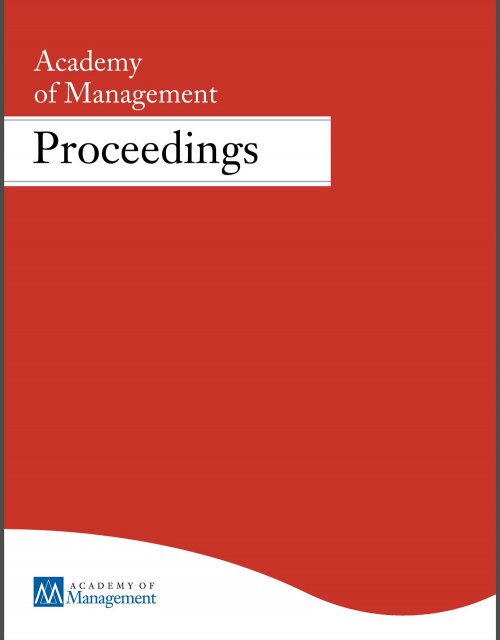Publication records
Subject(s)
Human resources management/organizational behavior
Keyword(s)
Error management
Recent research suggests that the management of organizational errors is increasingly a responsibility for top executives. The rise of democratizing technologies, such as peer-to-peer social media, appears to intensify the speed and consequences of these errors by challenging organizations’ relationships with key stakeholders. Engaging in the active management of unfolding organizational errors before they evolve into crises becomes a strategic concern in itself that challenges classic approaches. However, this new role for CEOs, board chairs and directors has received relatively limited attention in academic research: most recent literature focuses on learning after errors and failure not managing errors that is, engaging in actions to minimize negative and maximize positive outcomes of the errors as they occur. The limited attention may be due to the fact that research is done by different scholarly communities, from strategy to organizational behavior and specific streams that exchange too little between them. It is the purpose of this panel to explore the preferred research avenues going forward, all the while capitalizing on what we already know and what we need to know (and how) (i) with regard to organizational errors or errors in organizations (ii) in particular how errors are and can be managed from the top of the organization i.e. at the executive level and (iii) as distinct from error prevention (risk management, compliance, etc.), damage control (crisis management) and learning from errors (and failures). Key questions should revolve around: What is the role of senior executives in detecting and managing errors, so as to avoid them actually turning into disasters or failure? What is required from top executives for effectively doing so – for example what forms of leadership make executive error management more effective? What is the impact of executive error management on strategy – for example how does it affect the dynamic capabilities of the organization, or even bring about a new understanding of strategy as learning? We are gathering a panel of highly experienced scholars representing several of the major research streams with the aim of fostering a rich trans-disciplinary discussion. We plan to reserve ample room for dialogue with the audience, of which practitioners and consultants should form a significant part.
With permission of the Academy of Management
Volume
2019
ISSN (Online)
2151-6561
ISSN (Print)
0065-0668
Keyword(s)
Organizational learning, successes, failures, performances, leadership
Organizations learn from direct experience and the experience of others, and code these experiences as successes or failures by comparing against certain reference point. Although the growing literature on learning from success and failure has made meaningful headway in exploring these differences, our understanding of the processes through which learning through experience with failure and success is still quite limited. This symposium brings together a series of papers dealing with cutting-edge issues related to organizational learning from success and failure. Individually as well as collectively, these papers address fundamental, central, and unresolved questions regarding how organizations learn through successes and failures, why differences arise across these forms of learning, and what outcomes can be expected from related learning processes.
With permission of the Academy of Management
Volume
2019
ISSN (Online)
2151-6561
ISSN (Print)
0065-0668
Subject(s)
Health and environment; Technology, R&D management
An increasing number of research projects successfully involve the general public (the crowd) in tasks such as collecting observational data or classifying images to answer scientists’ research questions. Although such crowd science projects have generated great hopes among scientists and policy makers, it is not clear whether the crowd can also meaningfully contribute to other stages of the research process, in particular the identification of research questions that should be studied. We first develop a conceptual framework that ties different aspects of “good” research questions to different types of knowledge. We then discuss potential strengths and weaknesses of the crowd compared to professional scientists in developing research questions, while also considering important heterogeneity among crowd members. Data from a series of online and field experiments has been gathered and is currently analyzed to test individual- and crowd-level hypotheses focusing on the underlying mechanisms that influence a crowd’s performance in generating research questions. Our results aim for advancing the literatures on crowd and citizen science as well as the broader literature on crowdsourcing and the organization of open and distributed knowledge production. Our findings have important implications for scientists and policy makers.
With permission of the Academy of Management
Volume
2019
ISSN (Online)
2151-6561
ISSN (Print)
0065-0668
Subject(s)
Human resources management/organizational behavior
Keyword(s)
Gender, diversity, organization, performance, innovation
Extant research has shown that gender-diverse organizations tend to be more innovative than gender homogenous ones but has left unaddressed the question of who, among an organization’s workforce, becomes more innovative as gender diversity increases. We address this question by examining how gender diversity affects individual-level innovative performance, measured through patent-based indicators, within the R&D labs of the 40 largest pharmaceutical companies over the period 1985-2010. We argue that higher levels of gender diversity increase the performance of three categories of scientists – women, rookies, and brokers – whereas men, long-tenured scientists, and scientists embedded in constrained networks experience limited or no performance benefits. By demonstrating that gender diversity has a heterogeneous effect across different segments of an organization’s workforce, these results both deepen and qualify current understandings of how gender diversity affects innovation within organizations. A key implication of our proposed argument is that gender diversity does not only affect the overall performance of the organization; it also affects how performance (and hence the material and symbolic resources associated with it) are distributed within the organization.
With permission of the Academy of Management
Volume
2019
ISSN (Online)
2151-6561
ISSN (Print)
0065-0668
Subject(s)
Strategy and general management; Technology, R&D management
Keyword(s)
Co-development, R&D partnerships, cooperative R&D, joint R&D, technology alliances, joint innovation, co-innovation, relational quality, confidence in partners, trust and control
Volume
81
Journal Pages
24–50
Subject(s)
Information technology and systems; Technology, R&D management
Keyword(s)
open science, open educational resources, law, copyright law, data protection, privacy
The book provides an overview of legal questions in regard to open science, with a particular focus on issues of copyright and data protection.
Pages
156
ISBN
978-3-943423-66-2
ISBN (Online)
978-3-943423-67-9
Subject(s)
Human resources management/organizational behavior; Strategy and general management
Keyword(s)
Digital transformation, leadership, change
This field research case presents an account of leading digital transformation in a traditional organization. The case briefly traces more one hundred years of history of Klöckner & Co, an independent global steel and metal distributor, and presents challenges faced by the steel distribution branch. It then describes the thinking process of Gisbert Rühl, the company’s CEO concerned about taking the company into the future in the face of global changes faced by the industry. The case presents Rühl’s view of digital opportunities for the organization and his attempts to prepare the company for the digital age. The case pays particular attention to personal transformation of the leader in the in the process of transforming his company. It is intended for use in the MBA programs and executive education.
Key teaching/learning objectives:
- To demystify digital transformation in a traditional organization
- To explore the role of leaders in digital transformation
- To discuss the personal changes required of leaders working on digital transformation in their companies
| buy now | buy now | buy now |
Pages
18
Subject(s)
Human resources management/organizational behavior; Strategy and general management; Technology, R&D management
Keyword(s)
innovation, human resources, strategic alliances, mobility
ISSN (Print)
0017-8012
Subject(s)
Human resources management/organizational behavior
Keyword(s)
Team interaction, leadership, inquiry
Based on two studies of flight crew members in civil and military aviation, we observed that the best performance was achieved by the crews where the captain actively included other flight crew members in the decision making process by asking open questions. Furthermore, we observed that preferences of commanders for asking open questions differed markedly between the German and the Israeli air forces.
With permission of the German Armed Forces Aviation Office (Luftfahrtamt der Bundeswehr)
Volume
2
Journal Pages
16–20
Subject(s)
Technology, R&D management
Keyword(s)
patents, drugs, data exclusivity, clinical trials
JEL Code(s)
K41, L24, L65, O31, O32, O34
Also available on SSRN.
Pages
51

